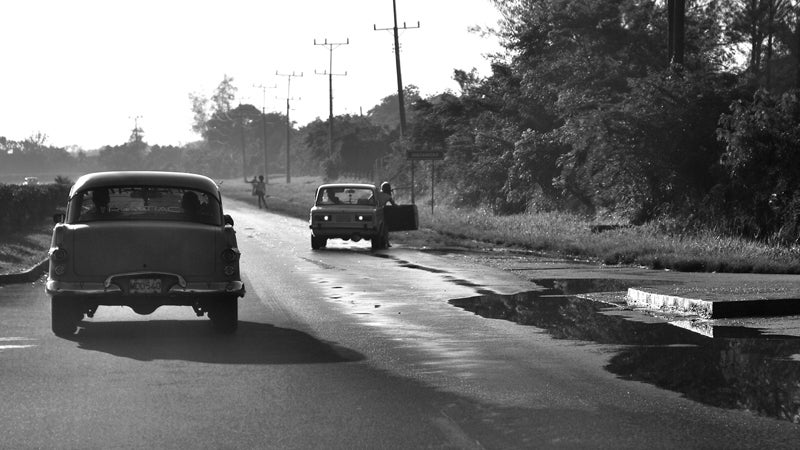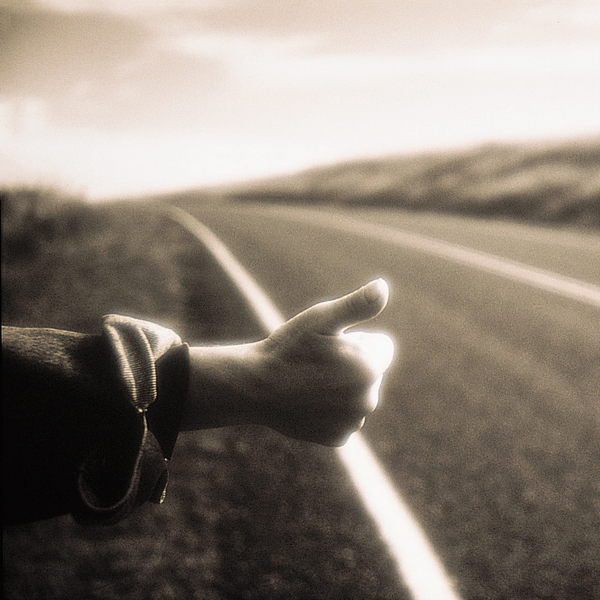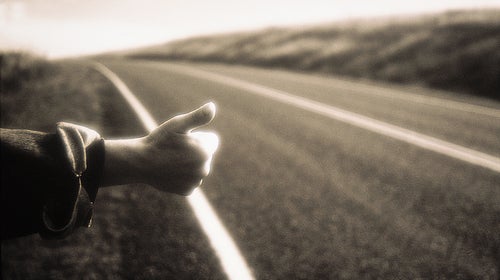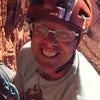The Universal Guide to Hitchhiking
Time was, you could crisscross America with nothing but a rucksack and a thumb. You still can, if you know how.
New perk: Easily find new routes and hidden gems, upcoming running events, and more near you. Your weekly Local Running Newsletter has everything you need to lace up! .
Another car blows by. I drop my arm and fold in my thumb. The driver didn't even look at me. He was staring down the road as though he saw something so interesting out there he couldn't take his eyes off it. It's a common response: I'll act like I don't see him so maybe he won't see me so I won't have to think about him standing there in the cold while I fly right past. The emperor's new clothes in reverse. I understand. Nobody likes to feel guilty.
Or maybe he doesn't feel guilty at all. Maybe he thinks I'm getting what I deserve, for what kind of an American doesn't have a car? What in the world did I do to lose this great country's God-given right to automobile ownership? I must have done something. Decent Americans, even decent poor Americans, own a car and drive it everywhere. A man afoot is a loser. A man afoot in America is no man at all.
I wait. A freezing prairie wind is rattling the reflector poles. It's trying to snow again. Flakes cartwheel across the highway like tiny tumbleweeds.
A pickup truck comes around the curve. The driver is wearing a cowboy hat. I put out my thumb and look him in the eyes. He looks right back into mine. People believe if they look into your eyes they can discern the truth—for instance, whether I'm an ordinary guy down on my luck or a serial murderer. It's nonsense, but if you want a ride you play along. The cowboy stabs sideways with his finger, indicating he's turning off just up the road. I wave and he casually salutes as he passes.
The snow is coming now, brilliant white confetti tumbling all around. I should put on my sunglasses but don't. Sunglasses make you look like you're trying to hide something. Your thoughts, your secrets, your identity.
A long, low-slung sedan shoots past. But then, in the corner of my eye, I catch the red glow of brake lights behind me. I spin on my heels, run down the road, swing open the car door, and get in.
Away we go.
There was a period in my life when I hitchhiked all over the country. The kind of car I could afford wouldn't have been reliable enough to go any distance, so I went without. I hitched from Wyoming to West 73rd in Manhattan to visit a friend. I hitched down to Tempe, Arizona, to see a girlfriend. I hitched out to Joshua Tree to go rock climbing. I hitched up to Boston to work for an uncle. Once, after a family reunion in Pennsylvania, I raced my own family back home to Laramie. It was a gentleman's bet. Dad stopped on the highway, I got out, and he sped away with Mom and my five younger brothers and sisters staring out the rear window. I was sitting on our dusty porch, pretending to read the newspaper, when they drove up.
By then I'd learned that there's a right way and a wrong way to hitchhike. There are rules. The rules are based on human psychology, on generalizations about human behavior that are mostly true but sometimes gloriously or horribly false—which would account for how I once got a ride in Utah from a woman so beautiful and lonely I stepped onto the road the next morning without my belt, and likewise how I once got a lift in South Dakota from a hippie so hurting he held a cocked revolver against my temple for an hour.
Eventually I got a car and stopped hitchhiking. I wasn't a starving writer anymore, just a writer. When you own a car you own the world. You are invincible, invulnerable, free. Whenever I saw a hitchhiker I picked him up. I'd been there. Some of them had sorry tales, meant to elicit sympathy—stories that, even if counterfeit in every detail, were honest enough in spirit.
But over the years, hitchhiking got a bad name, the number of hitchhikers dwindled, and I began to wonder if the practice was dying out. Fortunately, I'd recently received an invitation to a party in Santa Fe, New Mexico. I packed my rucksack, walked my kids to school, and asked my wife to drop me off at the edge of town. (Yes, she was upset about this potentially unhealthy exercise in investigative reporting.)
Rather than take I-25, which cleaves the plains from Wyoming south to New Mexico, I decided to thumb the blue highways down the spine of the Rockies. Fewer cars but fewer cops. Too many cars and everybody always thinks the next guy will pick you up. It was only about 600 miles, but given the current fear and loathing of hitchhikers, I figured I might be in for some long waits by the roadside. It was the dead of winter. I brought a sleeping bag.
My first ride was cheating. The driver was a friend.
“Mark! What in hell you doin' out there?” George said, flicking his cigarette out the window with the stumps of his thumb and fingers. He'd lost them in a sawmill accident. Dylan's Blood on the Tracks was playing on the tape deck.
“Little experiment.”
George told me a story about how he once hitchhiked up to Sheridan, Wyoming, with four Dostoyevski novels and hid out in a motel just reading.
“Finest damn week of my whole damn life,” he declared.
George dropped me off at the sawmill turnoff, 12 miles out of town. “Good luck, man,” he said, adding, “I wouldn't have picked you up if I didn't know you.”
I didn't wait five minutes before the next car stopped. Country music on the radio. Driver's name was John. Thin black mustache, smoked discount cigarettes. A traveling salesman.
“Industrial parts. I used to be in-house sales. Then one day I couldn't take it anymore. I couldn't take one more minute being inside an office.”
At the mountains we disappeared into a blizzard, the snow swirling in from all directions. We slowed down to 20 miles an hour.
“Drove a truck before,” John said. “You don't take chances with snow. Nothing wrong with being a little late. Go off the road and you could be late forever.”
Peering through the fogged windshield, I thought how grand it was to be inside, dry and warm and moving along, when I could just as easily have been outside, cold and wet and going nowhere.
John started to talk about his 14-year-old son and I listened. This is what you should be good at if you want to hitchhike. Everybody needs somebody to talk to and people will tell a stranger things they'd never tell their own spouse. They know they'll never see you again and they know you'll never meet the people in their story either, so they feel free to go ahead and tell the truth.
John said he doesn't know where his son gets it. Kid is a straight-A student, always has been. And he's playing on the high school basketball team, even though he's still in junior high. “Boy's just got the fire in him.”

He talked about his son until he'd covered everything that amazed him about this child of his, then talked about his daughter, who wants to go to the Air Force Academy in Colorado Springs. “And I'll bet you she will.”
John dropped me off where the road splits, a desolate place. At the three-way there was a wooden cross in the weeds: Tara Swanson/Nov 20, 1973–May 24, 1998/Tara We Miss You.
I paced back and forth to keep warm. Three cars passed in a row, then 20 minutes went by before another vehicle appeared. It was a semi, rolling steady as a steam engine through the storm. Truckers don't stop for hitchhikers anymore. Their insurance forbids it. I'd decided not even to stick out my thumb. Then abruptly did it anyway.
Next thing I knew I heard the whoosh of the brakes, the engine groaning, the tranny downshifting, and the tractor-trailer shuddered to a stop—dead in the middle of the road. The door swung open above my head, and I climbed up into the cab.
“Been standing there long?” The driver had a good-natured, saggy-jowled, cocker-spaniel face.
“Not too.”
I watched him work through the gears, getting the beast back up to speed.
“Eighteen of 'em,” he said. “Some trucks have ten, some 14. Eighteen's better if you're running a lot of up and down.”
He was wearing a trucker's baseball cap, had forearms thick as thighs and a vast belly. I figured he must have been a trucker his whole life.
“Nope. Started four years ago.”
He said he's doing it for the money.
“Wife is getting used to it now. Learning how to do a few things 'round the house that I used to do. My boys are 15 and 20 and pretty much doing their own thing. They don't miss me that much.”
He's only home two nights a week. Rest of the nights he sleeps in his cab. He eats in his cab too, cooking off a hot plate to save a little money. He doesn't like truck stops and only uses them for a shower.
“Ten hours or 600 miles, each and every day.” He doesn't doctor his books.
“I guess you could say I live here, right in here, all the time. They told me when I first started that being a trucker was a lifestyle, not a job. They turned out to be right about that at least.”
“What do you do at night?”
“Read. I got a little TV but I like reading better.” He threw his eyes back over his shoulder toward a stack of paperbacks on his bunk.
He talked about his sons as we cruised through Cowdrey and Walden and then traversed the hay fields of North Park, riding high above the ground blizzards writhing across the road. He dropped me off at Muddy Pass. He was continuing west on Highway 40.
“Was good to have your company, but just so nothing gets back to anybody, I'd appreciate it if you didn't remember me.”
People in giant SUVs with ski racks blasted past me, one after another. I didn't care. Three good rides and I was on a roll.
It was snowing hard again, soaking my jeans. I half wished I hadn't shaved, but facial hair is out. So is long hair. Leather jackets. Ragged anything. All our mothers told us not to judge a book by its cover, and every one of us does it all the time. You want a ride, you need to look normal.
If you look strange, strange people will pick you up. Strange people are supposed to be interesting, but usually they're just messed up, and if you happen to get caught up for even 15 minutes in their messed-up lives, you can get killed.
But it's not only looks. Posture is also important. No slouching. Shoulders back, chin up, both hands out of your pockets. Have your hands hidden in your pockets and people don't know if you have something in them or not and start imagining all kinds of things. Stand natural, not trying to conceal anything about yourself, looking like all you want is a ride, because that's the truth. Your hitching arm should be slightly bent, steady but relaxed. Never stretch your arm out and strain into the traffic or jug your arm up and down. That makes you look desperate. Desperation's one of those things people will go out of their way to avoid.
After a while, a little car stopped and I folded myself clumsily into the backseat. Reggae music, chimes hanging from the mirror, peace sticker on the window.
“I'm Emily,” said the woman in the passenger seat.
“I'm Justin,” said the driver.
They both reached back between the seats to vigorously shake my hand. They were on their way to an Earth First! meeting in Boulder. They were so happy to see me I might as well have been family.
Emily had just finished studying in India for two years and will be going to Colorado College in the fall. Justin had camped out in trees in Oregon to protest clear-cutting and was bound for Chile to study permaculture. They were planning to save the world. I found myself envious—I was once like them. They gave me hope.
“Earth First,” Justin expounded, “is a non-organization made up of non-members dedicated to not giving up.”
When they dropped me off in Dillon, Justin tore a strip from a poetry paperback and wrote down his e-mail address. As they drove away, I turned the scrap over in my hand to find the last line of a poem: “You shall above all things be glad and young.”
I shouldered MY pack and walked to the I-70 on-ramp. It wasn't a big pack. People see a big pack and they have an excuse: I don't have room. Hitchhiking without a pack, however, is worse. People wonder what the hell you're doing out there with nothing.
I've seen a few people hitching with suitcases, but that's weird. People with suitcases look like the kind of people who should be taking a bus or the train, or like someone who's hoping someone will listen to them for a while and then talk them out of it and drive them back home.
A pickup pulled over.
“Just throw it in the back.”
Guy's name was Bobby. “I hitched myself for 15 months,” he said.
I wondered why he was so specific.
“DUI. Lost my driver's license. But everything works out for the best. I learned a lot about people, having to hitchhike every day.”
Bobby said he gave his life to Jesus about a year ago and hasn't touched alcohol since. He went ten miles out of his way to drop me off on Highway 91.
A husky came trotting up to me and nuzzled my hand. No fear of strangers whatsoever. I scrubbed his lower back and his tail went mad, then he traveled on, content as only dogs know how to be.
I've met people hitching with dogs, but it's dumb. Dog people like dogs, but the rest of the world is full of cat people or people unattached to the animal kingdom. I've also met people hitching with other pets, mostly small animals they hide in their coats. They feel out the situation to see whether they should show the driver their friend. I've met people with gerbils and snakes and guinea pigs and ferrets.
A corollary to no pets is no pals. Two guys standing on the road looks too much like two guys either trying to get away from trouble or trying to get into it.
I was standing there thinking about this when the driver of a car going maybe 60 slammed on the brakes and fishtailed to a stop.
I looked through the window before opening the car door. The driver was staring straight ahead, both hands on the steering wheel. He had a crew cut, a scar on his forehead, and a tattoo of a cross on his left hand. He was wearing Carhartt overalls splattered with cement mud. The car was a mess inside. I got in.
The first few minutes in a car with a stranger are always the most tense. You've got all your antennae working to figure out the score, and so does the driver. You can both feel the vibes. Most of the time a simple conversation starts itself and the atmosphere soon clears, but not always.
I once got into a Cadillac in Iowa. The car was immaculate inside and out. So was the driver, even though he was probably 90 years old. He didn't say a word for half an hour. He just drove smoothly through the cornfields. He eventually turned his white head toward me and said, “Well, if you're plannin' on killin' me, you might as well git it over with.” I didn't know whether to laugh or cry. After I'd convinced him I didn't want anything more than a lift, he told me how he'd fought in the Great War and then hitchhiked from New York City back to Iowa. “I was still in my uniform,” he said. “There weren't many cars but not one ever passed me by.”
Now I introduced myself to the driver.
“Calvin,” he replied, and we shook. His hand was thick with muscle.
I took a guess. “You lay concrete.”
“Sewer line.”
I got him to tell me a little about his work, but he wasn't the talkative kind so I left it alone. He drove fast but knew how.
Calvin was going home to Antonito to see his girlfriend and visit his family. It was dusk when we got there. It had been the best ride of the day. Long, fast, no small talk. He took me on a brief tour of his hometown, pointing out a house-cum-castle built of aluminum cans, and then dropped me off.
Highway 285 South into New Mexico is a lonesome stretch, especially at night. The only vehicle that passed me was a Colorado State Patrol car. I didn't have my thumb out, but the patrolman knew exactly what I was up to. He also knew that I knew that if I was still there when he passed by again, he'd pick me up.
Hitchhiking is against the law almost everywhere. But the law is as malleable as the people who enforce it. I must have been picked up by the highway patrol 50 times. They put you in the backseat and run a check on you to make sure you haven't killed anybody lately. Then you get the lecture about how hitchhiking is illegal and they could put you in jail just like that if they wanted to. Be polite and keep your lip zipped and they'll usually let you out and tell you to disappear.
The moon was up when the cop came back. I was less than a hundred miles from my destination, but nobody stops when it's dark.
The cop was turning around, his headlights strafing the sagebrush, when an 18-wheeler inexplicably roared to a halt and the cab door flew open.
We made it to Santa Fe in two hours, riding through the velvet desert counting shooting stars.


